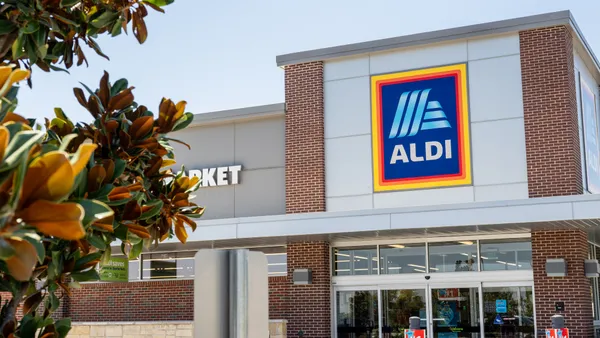Dive Brief:
- Uber is exploring the possibility of launching a grocery delivery service in Europe, according to Bloomberg.
- The company is speaking with "a number of major supermarkets around Europe," an Uber spokesperson told Bloomberg, including Sainsbury's, the second largest grocer in the U.K.
- If it enters the market, Uber would be competing with food delivery services like Deliveroo and Just Eat and online grocery retailers Amazon and Ocado.
Dive Insight:
With evidence of actual talks taking place with key grocery partners in Europe, Uber’s plans to break into grocery delivery are becoming more concrete. While there are already many e-commerce players fighting for market share in the U.K., the appetite for grocery delivery there is large and Uber sees opportunities abroad. Online grocery shopping has become the fastest-growing purchase channel for the U.K., with the average value of weekly online sales at food stores doubling between 2010 and 2016.
One of Uber's stiffest competitors will be food delivery service Deliveroo. The company recently received a $575 million investment from Amazon and has also started delivering Sainsbury’s pizza in four cities. The supermarket chain was the first in the U.K. to offer ready-to-eat items through Deliveroo’s app, which could be the beginning of a natural segue into Deliveroo offering other grocery items through its service, as well.
Another player that Uber will need to watch both in the U.S. and abroad is Ocado. The e-grocer will open multiple fulfillment centers in partnership with Kroger, and has invested in the largest vertical farm in Europe. While Uber doesn't have plans to try to match Ocado's size and scale, it will have to go head-to-head with the company in order to win grocery delivery customers.
Uber’s expansion overseas could help it perfect a grocery service before launching domestically, especially since it will have to battle a few companies that are already well-established in the delivery sector. Grocery delivery is a difficult proposition with complicating factors like labor, thin margins and fierce competition over who can offer the cheapest delivery fees.
In North America, Uber has been vocal about its interest in grocery delivery. In March, the company announced the opening of an engineering hub in Toronto that it described as having "a pivotal role" in developing the offering. It listed a job opening for "head of grocery" for its Toronto office in November 2018.
This week, Uber laid off 400 of its 1,200 marketing employees to restructure its team. The news comes after a rocky IPO and the removal of its chief marketing officer position last month, making it seem as though the company is shifting gears to focus more on other initiatives — like grocery.








